Villazón, Bolivia – It is unfair to judge an entire country from a brief encounter, especially if that time was spent in a small border town. I know that. Still, I return from my trip north basically pissed-off by an experience colored by a few bad hombres. I will try to recount the last few days as best I can, though much of it is blurred by emotion. I’ll get to the food in a separate posting.
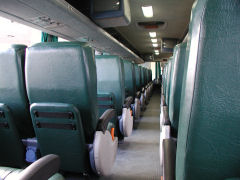 Henry and I began our trip in style. I was a bit trepidatious about spending most of a day on a bus, but it was the only affordable way for us to travel where we were headed. The long distance busses turn out to be pretty comfortable, with seats that are well spaced and recline, and foot boards that fold down, more or less giving you a 45° angle to sleep. Multiple movies were shown – things like Vertical Limit and Gladiator, all in English with Spanish subtitles. The seats were comfortable, the busses were clean and well maintained, overall it was actually a more comfortable way to travel than most coach class compartments in an airplane. I do recommend bringing your own roll of toilet paper – both for quality, and somewhere during a long trip, there’s a good chance the bathrooms will run out. Also bring lots of water for trips, especially to areas with very dry air, like the mountains.
Henry and I began our trip in style. I was a bit trepidatious about spending most of a day on a bus, but it was the only affordable way for us to travel where we were headed. The long distance busses turn out to be pretty comfortable, with seats that are well spaced and recline, and foot boards that fold down, more or less giving you a 45° angle to sleep. Multiple movies were shown – things like Vertical Limit and Gladiator, all in English with Spanish subtitles. The seats were comfortable, the busses were clean and well maintained, overall it was actually a more comfortable way to travel than most coach class compartments in an airplane. I do recommend bringing your own roll of toilet paper – both for quality, and somewhere during a long trip, there’s a good chance the bathrooms will run out. Also bring lots of water for trips, especially to areas with very dry air, like the mountains.
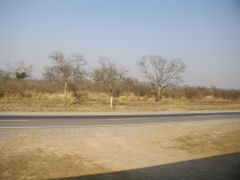 Why, you might ask, were we headed to a frontier town in Bolivia? Here’s the nutshell version – and some day Henry will be able to read this in English and probably get pissed at me for presenting it, but it’s my blog. He originally came to Argentina to study at the University of La Plata, specializing in anthropology and folklore studies. After four years of study, he went home to Peru for a week or so before returning for his final exam (apparently there is a big, final exam that is somewhat comprehensive, sort of an on-the-spot thesis). At the border, on his return, the Argentine frontier guards at the border with Bolivia refused to let him in because, despite being a registered student, he couldn’t officially show “the means to survive” on his own in Argentina. He did what any poor, struggling student at the time might have done, he snuck across the border and made his way back to school. Unfortunately, he found that because his status in the country had been revoked, his professors wouldn’t sign off on his final exam. Four years of university work down the drain.
Why, you might ask, were we headed to a frontier town in Bolivia? Here’s the nutshell version – and some day Henry will be able to read this in English and probably get pissed at me for presenting it, but it’s my blog. He originally came to Argentina to study at the University of La Plata, specializing in anthropology and folklore studies. After four years of study, he went home to Peru for a week or so before returning for his final exam (apparently there is a big, final exam that is somewhat comprehensive, sort of an on-the-spot thesis). At the border, on his return, the Argentine frontier guards at the border with Bolivia refused to let him in because, despite being a registered student, he couldn’t officially show “the means to survive” on his own in Argentina. He did what any poor, struggling student at the time might have done, he snuck across the border and made his way back to school. Unfortunately, he found that because his status in the country had been revoked, his professors wouldn’t sign off on his final exam. Four years of university work down the drain.
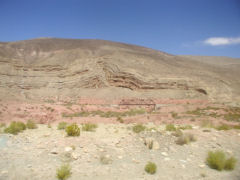 Despite the economic collapse here, things were still better than back in Peru, so he stayed. And stayed. Two and a half years later he’s decided it’s time to correct some mistakes. Having entered Bolivia legally (from Peru one must cross either Bolivia or Chile to get to Argentina), and after talking to several friends and members of his family, he decided his best recourse was to return there, pay the fine for overstaying his Bolivian visa, and then, re-enter Argentina legally. He basically needed to show that he had at least $1000 in his possession to re-enter, and we also figured that me being with him would add some weight to the process. The best laid plans and all that…
Despite the economic collapse here, things were still better than back in Peru, so he stayed. And stayed. Two and a half years later he’s decided it’s time to correct some mistakes. Having entered Bolivia legally (from Peru one must cross either Bolivia or Chile to get to Argentina), and after talking to several friends and members of his family, he decided his best recourse was to return there, pay the fine for overstaying his Bolivian visa, and then, re-enter Argentina legally. He basically needed to show that he had at least $1000 in his possession to re-enter, and we also figured that me being with him would add some weight to the process. The best laid plans and all that…
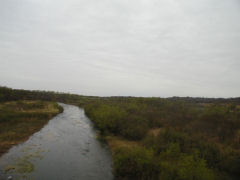 Although he was fearful that somewhere along the route to the border the bus might be stopped and searched (more about that in a bit), we made our way through various towns and the scrublands of Tucumán, Salta, and Jujuy provinces without any incident. After roughly 21 hours we found ourselves in the town of Jujuy, where we’d planned to spend a day exploring, beforing continuing on to la frontera. As it happened, there was another bus leaving for the frontier fifteen minutes after we arrived, and we decided that any time was as good as any other time, so off we went, for another five hours in a bus to the border town of La Quiacha. As we climbed into the mountains we could hear the wind steadily increasing, and the double decker bus began to sway back and forth. Interestingly, with just low scrub and cactus, looking out the window everything seems calm.
Although he was fearful that somewhere along the route to the border the bus might be stopped and searched (more about that in a bit), we made our way through various towns and the scrublands of Tucumán, Salta, and Jujuy provinces without any incident. After roughly 21 hours we found ourselves in the town of Jujuy, where we’d planned to spend a day exploring, beforing continuing on to la frontera. As it happened, there was another bus leaving for the frontier fifteen minutes after we arrived, and we decided that any time was as good as any other time, so off we went, for another five hours in a bus to the border town of La Quiacha. As we climbed into the mountains we could hear the wind steadily increasing, and the double decker bus began to sway back and forth. Interestingly, with just low scrub and cactus, looking out the window everything seems calm.
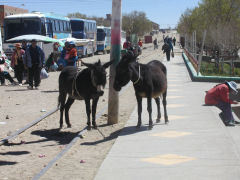 Here’s where things get interesting. The border with Bolivia is both open and closed. It’s a very odd experience for someone like myself who is used to entering and leaving countries through airports and/or major highways. There’s a bridge over a small chasm. On the Argentine side there are two immigration offices, one for leaving, one for entering, and a squad of military police and customs officials patrolling the area. On the Bolivian side there is a tiny office with a desk in it, and one immigration officer, along with a couple of federal policemen hanging out in a neighboring office. You have a choice – you can go through the standard paperwork of getting your passport stamped on both sides, etc., or you can just ignore the whole thing. If you aren’t carrying all sorts of stuff, no one pays any attention. All day long migrant workers, locals, and tourists pass back and forth without incident and without even talking to an official on either side of the border.
Here’s where things get interesting. The border with Bolivia is both open and closed. It’s a very odd experience for someone like myself who is used to entering and leaving countries through airports and/or major highways. There’s a bridge over a small chasm. On the Argentine side there are two immigration offices, one for leaving, one for entering, and a squad of military police and customs officials patrolling the area. On the Bolivian side there is a tiny office with a desk in it, and one immigration officer, along with a couple of federal policemen hanging out in a neighboring office. You have a choice – you can go through the standard paperwork of getting your passport stamped on both sides, etc., or you can just ignore the whole thing. If you aren’t carrying all sorts of stuff, no one pays any attention. All day long migrant workers, locals, and tourists pass back and forth without incident and without even talking to an official on either side of the border.
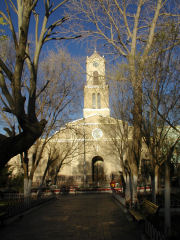 We’d decided that Henry would cross that way, and I’d go through the official process, the basic premise being that I’d crossed over, met up with a friend who had been “living in Bolivia,” and he’d decided to accompany me back to Argentina for a visit. Once back in Buenos Aires we could deal, through our attorney, with getting him a new residence permit and all that – but he needed that legal entry stamp first. He crossed without incident, I got in line for immigration, got my stamp, walked across, filled out my forms, and got my entry stamp, and joined him. The border guards on both side were quite amiable, the one on the Bolivian side joking with me about not even really needing to go through the process, especially if I was only staying for the day.
We’d decided that Henry would cross that way, and I’d go through the official process, the basic premise being that I’d crossed over, met up with a friend who had been “living in Bolivia,” and he’d decided to accompany me back to Argentina for a visit. Once back in Buenos Aires we could deal, through our attorney, with getting him a new residence permit and all that – but he needed that legal entry stamp first. He crossed without incident, I got in line for immigration, got my stamp, walked across, filled out my forms, and got my entry stamp, and joined him. The border guards on both side were quite amiable, the one on the Bolivian side joking with me about not even really needing to go through the process, especially if I was only staying for the day.
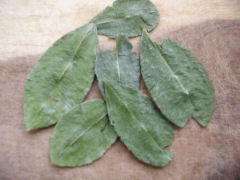 We got a hotel room, explored a little of Villazón, the town on the Bolivian side of the border, in the twilight, had a decent dinner at a local spot (more on that in the next post), and retired to the hotel to catch up on sleep. We were both experiencing a bit of altitude sickness, with its accompanying headaches, so a couple of cups of te de coca, or coca-leaf tea (yes, the leaf from which cocaine comes) which apparently helps you with the absorption of oxygen at high altitude, and we were feeling much better. In the morning, we were ready…
We got a hotel room, explored a little of Villazón, the town on the Bolivian side of the border, in the twilight, had a decent dinner at a local spot (more on that in the next post), and retired to the hotel to catch up on sleep. We were both experiencing a bit of altitude sickness, with its accompanying headaches, so a couple of cups of te de coca, or coca-leaf tea (yes, the leaf from which cocaine comes) which apparently helps you with the absorption of oxygen at high altitude, and we were feeling much better. In the morning, we were ready…
Back to the border, and the same Bolivian immigration officer, and here’s where things get ugly. Now, we’d already checked this out. La multa, or fine, for overstaying your visa in Bolivia, should be the equivalent of $30. It’s published by the Bolivian government. Try telling that to a greedy frontier guard. The first thing he did was confiscated Henry’s passport, and then, in consultation with some guy who was standing around in t-shirt and jeans, no idea on our part who he was, announced that the fine was 7000 bolivianos, or close to $1000. I guess I looked wealthy to them. Officially I’d guess he was supposed to detain Henry until the fine was paid, but he told us to go talk about it, and then come back and pay the fine. I’m sure there was some negotiation available, but Henry was totally adamant against paying “the thieves” anything.
We spent the day wandering around more of Villazón and minor arguments about what to do. I was for negotiating and paying some amount, that still would have been too high, but would have gotten us back across the border safely. He wasn’t, and in the end, this was his decision to make. For his part, and more to come as things unfold, he decided to hop a bus to La Paz, Bolivia’s capitol, and from there to the Peruvian border, a town called Puno, where he would cross the same way as we’d done here. Once in Peru, he could go to a passport office and apply for a new one (he still has his national identity card, or DNI, and other identification, including a copy of his birth certificate) to replace the “stolen” one, and then return either via air, or through Chile rather than Bolivia. Although in my heart I wanted to accompany him, there were many logistical and financial reasons to keep this trip to a single person.
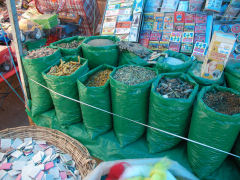 A good portion of the day we spent wandering through the Sunday “fair,” pretty much a staple in Latin American countries. Lots of knock-off clothing, and various things like utensils and small appliances – pretty much the same things you see in fairs anywhere. There are also many fruit, vegetable, and herb stands. This includes, by the way, places that have sacks of coca leaves sitting openly (in leaf form, the stuff is legal throughout most of South America). We picked some up to chew on to keep the effects of the altitude down, a real necessity if you’re not used to breathing rarified air.
A good portion of the day we spent wandering through the Sunday “fair,” pretty much a staple in Latin American countries. Lots of knock-off clothing, and various things like utensils and small appliances – pretty much the same things you see in fairs anywhere. There are also many fruit, vegetable, and herb stands. This includes, by the way, places that have sacks of coca leaves sitting openly (in leaf form, the stuff is legal throughout most of South America). We picked some up to chew on to keep the effects of the altitude down, a real necessity if you’re not used to breathing rarified air.
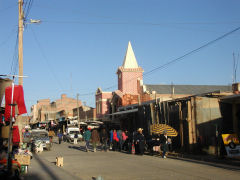 Basically all of Villazón is oriented around cheap products for people crossing over from Argentina, not quite souvenirs, more of just that the Bolivian economy is so bad that it’s worth it for Argentines in the north to cross over, pick things up, and pay customs taxes on them. One of the depressing things for me, and more of what continued to color my experience in Bolivia – constant abuse of the locals by both the local and national police. I saw officers walk up to market stands and just grab stacks of goods and walk away with them. At one point, an officer took a stack of clothing from an elderly woman. She chased after him and grabbed them back. The only thing that stopped her from being beaten was that fellow officers started loudly joking and taking bets that even with his nightstick (which he’d already pulled out) and gun, he was going to get his ass kicked by a grandma. I saw officers cornering kids who’d been begging for change and taking it away from them (we’re talking about amounts that are less than a dollar). I saw officers pushing their own people around, constantly.
Basically all of Villazón is oriented around cheap products for people crossing over from Argentina, not quite souvenirs, more of just that the Bolivian economy is so bad that it’s worth it for Argentines in the north to cross over, pick things up, and pay customs taxes on them. One of the depressing things for me, and more of what continued to color my experience in Bolivia – constant abuse of the locals by both the local and national police. I saw officers walk up to market stands and just grab stacks of goods and walk away with them. At one point, an officer took a stack of clothing from an elderly woman. She chased after him and grabbed them back. The only thing that stopped her from being beaten was that fellow officers started loudly joking and taking bets that even with his nightstick (which he’d already pulled out) and gun, he was going to get his ass kicked by a grandma. I saw officers cornering kids who’d been begging for change and taking it away from them (we’re talking about amounts that are less than a dollar). I saw officers pushing their own people around, constantly.
I saw Henry off on a bus to La Paz, and headed downhill to the border. The same border guard was on duty – I’m guessing he and maybe one other person (who you’ll meet in a moment) are pretty much it for the border. This was unfortunate, and the real “topper” to the day. He promptly confiscated my passport and demanded to know where Henry was and why I hadn’t paid the fine. Now, standing in the middle of an airport somewhere, I’d have gotten into an argument, and it would have just been a matter of time, regardless of how pissed the immigration officer was, to resolve things. But I’m standing in the wild, wild west, with an armed military officer, who clearly doesn’t think he answers to anyone other than his own greed. The best I could do was stand my ground, hoping to wear him down, and insist that to the best of my knowledge Henry had “returned home,” with the intent to handle things himself via the Peruvian embassy, and that regardless of this official’s opinion of my personal fortunes, I wasn’t responsible for “my friend’s” financial problems.
He didn’t give any ground, and I didn’t, and we stalemated for about ten minutes. Thankfully, fate intervened in the form of his shift replacement arriving, who apparently, and luckily, turned out to be his superior officer. She demanded an explanation, got his version and mine, which pretty much agreed, she looked him up and down, hauled off and decked him, ripped my passport out of his hands, stamped it and returned it to me. Unfortunately it was too late to go get Henry and probably get across the border for the correct cost, but I got myself across the border without further incident, leaving the two of them behind in furious argument. Fortunately, at least, I was pretty sure that Henry was now safely out of this guy’s reach, as there are too many busses and such for him to bother trying to find Henry.
I will just say, I saw more police/military abuse and corruption in one day in Bolivia than I’ve seen in the rest of my 47 years of life. And I’ve had ample opportunity, both in travels around the world, plus in having spent 8 years working in emergency services in both Michigan and New York, to witness it. Given that Bolivia is a country founded by someone who believed deeply in honor, integrity, the rights of the poor, and unity between all of Latin American countries, it’s a real shame that the first public face that many folks will see on entry to the country is this one. Hence the title of today’s column.
Still, I spent the last day worried that something else might go wrong. I’ll skip the suspense – I had an e-mail waiting when I got home at 5:00 this morning letting me know that Henry was safely in Puno, Peru, planning to head for his hometown of Trujillo this morning. That makes more sense than spending a week or more in a hotel in the border town of Puno with nothing to do. At least this way he gets to spend some time with his family while waiting for his passport to come in, and has some resources to draw on if there are any further problems. More as the situation unfolds, though I don’t expect there will be much of an update until he’s got the passport and is ready to return.
My trip was pretty much uneventful – though the timing sucked – I had to wait a little over four hours at the bus terminal in La Quiacha for the next one back to Jujuy – and this bus terminal is little more than a series of roadside shacks for offices and some parking spots for busses. Boring and cold, though to his credit, the ticket guy for my bus line let me sit inside his office for the time. The bus did get stopped twice during the five hour trip by Argentine immigration police – and everyone had to present their documents (this is what Henry had been afraid of enroute, but apparently, and understandably, they’re more concerned about folks coming in than leaving). I was ready for witnessing more abuse at this point, but I will say that the Argentine immigration police were, without exception, polite and respectful of people, even those who they asked to exit the bus temporarily while their documentation was verified. At the Jujuy end, a minor hitch, the ticket guy hadn’t told me there was a 7½ hour layover before the connection to my return bus to Buenos Aires. It was 4:00 in the morning. The temperature in the mountains was low 40s. The station in Jujuy isn’t much more than the border station – it has a waiting room, but the room is open on one side and not heated, plus it was already packed with folks waiting for their busses.
I was actually ready to say the hell with it, grab a taxi to the local airport, and pay for a one-way ticket back. Not going to happen – according to the taxi drivers I talked to, first off, the airport wasn’t likely to be open before 6 or 7 in the morning (still better than waiting until 11:40), and second, it was far enough away that none of them were willing to drive me there. How do folks get to the Jujuy airport? Apparently the only folks who fly either have their own cars, or hire a remis, a private car and driver, to take them. Any remis stands around? Nope, and certainly nothing open that early. Luckily, looking around, I saw that one of the other bus companies had a bus leaving at 6 a.m. Despite not being able to get a refund on my first ticket ($35), I popped for another ticket and got myself warm starting after only an hour and a half in the frigid air. The rest of my trip passed without incident and I arrived safely home at 5 a.m. this morning.
[…] one of my favorite snarky food writers, quote above, all about the coca. Nothing to do with the leaf, nor the soft drink, but the Spanish flatbread pizza… and I started thinking, hmmm… I […]
[…] the first time we’ve been there (other than passing nearby and along part of the same route when we went to Bolivia a decade ago). Our original intent was a trip to Cafayate, where we had a complimentary stay at one […]
[…] the first time we’ve been there (other than passing nearby and along part of the same route when we went to Bolivia a decade ago). Our original intent was a trip to Cafayate, where we had a complimentary stay at one […]
[…] an apartment in a “foreign” country, opened a business, experienced a cyclone, been threatened by border guards in Bolivia… Not things I would have predicted a mere twelve months […]